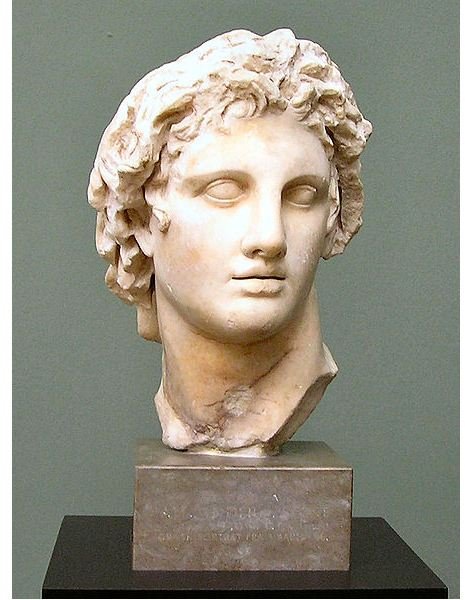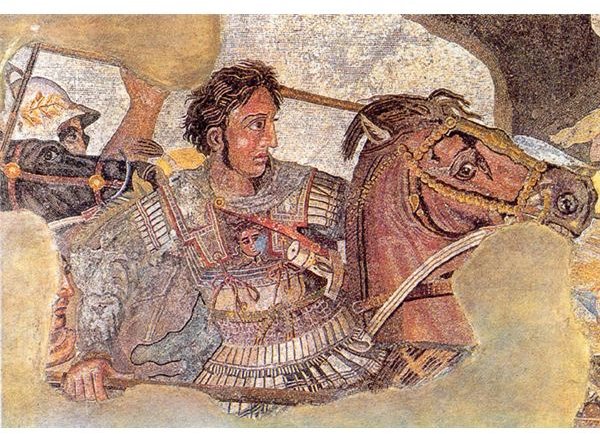Introduction to Alexander the Great: Lesson Plan for Grades 9-12
Who were the Macedonians?
This is a question with more than one answer, but one that must be considered before beginning the any lesson. Macedon rose as a power during the 4th century BC and many believe the Macedonians were Greek. Others maintain they were of Slavic origin and point to the modern day Macedonia north of Greece as proof. Citizens of this nation are primarily Albanian and there is question regarding the Macedonian language’s relation to Greek.
Regardless of the ongoing debate, the Macedonians of Alexander’s time spoke Greek but were not viewed as Hellenes or the “true bearers of Greek Civilization”. (Wood, pg. 22) Instead they were a militaristic culture of hard-drinking, rugged men deemed barbarians. Alexander’s father, Phillip, was no exception. After forming his kingdom from an array of different tribes and communities, Philip used the strength of his newly developed infantry phalanx during the battle of Chaeronea to crush the southern Greek states’ hoplites in 338 BC and bring Greece under his rule.
King Philip was murdered in 336 BC; 20 year old Alexander stepped up as King.
Biography

Alexander was born in 356 BC to King Philip and his wife Olympias, a native of a border area with Albania known as Epirus. Historians describe Olympias as an emotional woman who believed in unusual cults, worshiped Dionysus (god of ecstasy and possession), and handled snakes. It is believed that Philip became infatuated with Olympias when she was 14 at the celebration of the mystery cult on the island of Samothrace. However, it was also a political savvy move in that his marriage sealed an alliance with western principalities. Legend holds he grew disenchanted years later when he saw her with a snake in her bed.
Eventually, Philip shunned Olympias for a younger wife who bore him another heir. (Polygamy was practiced among Macedonian royalty). Afterwards, Alexander lived in Epirus for a time with his mother, only to return to insults over Philip’s new wife and heir. A close and potent pair, Alexander allowed his mother to have this wife and her child put to death when he assumed the throne. (Wood, pg. 24)
As a child, Alexander would exhibit characteristics gleaned from both his parents. Like Philip, fearlessness and an ability to evaluate a situation were apparent in the story of Bucephalas (ox head), an untamable horse which Alexander wagered his father he could master. Noticing the horse jumped at its own shadow, the young Alexander led Bucephalus straight into the sun, mounted the horse and rode away. His skill at military strategy was admired at Chareonea, and he is said to have questioned Persian envoys about the geography of their land. Like Olympias, Alexander was temperamental, believed in oracles and omens and developed an interest in cults.
Sent to study with Aristotle, the teenage Alexander began a lifelong dedication to philosophy. Aristotle gave Alexander his copy of the Iliad which Alexander carried with him throughout his life. An admirer of Achilles, Alexander claimed he was a descendant on his mother’s side. He also believed himself to be a descendant of Heracles, (Zeus’ grandson), on his father’s side. All of Alexander’s traits would define him as an adult and embolden him to expand his empire as far as India.
It’s probably impossible to teach a lesson on Alexander the Great without the subject of his sexuality being raised. As with many aspects of Alexander’s life, there is no definitive answer. The people of Alexander’s time and society were not in the custom of describing a person by their sexuality. It is known that Alexander did not have a physical relationship with a woman until he was 23. He married twice and had two children with his first wife, Roxanne. Alexander also had a son with his mistress Barsine.
His strongest emotional tie, other than his bond with Olympias, seems to have been with Hephaistion. A friend since childhood, Hephaistion was known to be Alexander’s favorite among a close circle of male friends and appears frequently in images of Alexander. Hephaistion never fell out of favor with the king (unlike many others) and Alexander is quoted as remarking, “Others loved me because I am King. Hephaistion loved me for myself.” Whether lifelong friends or romantically involved, it is known that Alexander was inconsolable upon Hephaistion’s death. (Hephaistion drank himself to death.) He wept over his body for an entire day, had the doctor crucified and, like Achilles after the death of Patroclus, cut off his hair.
Lesson Plan
Focus: Alexander the Great and why he was influential in Ancient Greek and World History.
Grade Level: 9-12
Prior Knowledge: None
Time Needed: 1 period.
Educational Standards:
- NCSS Thematic Standard: II Time, Continuity, and Change.
- NCSS Thematic Standard: VI Power, Authority, and Governance.
- NSS-WH.5-12.1 ERA 3: Classical Traditions, Major Religions, and Giant Empires, 1000 BCE-300 CE; Standard 2, The emergence of Aegean civilization and how interrelations developed among peoples of the eastern Mediterranean and Southwest Asia, 600-200 BCE.
Discuss the life of Alexander.
- Early Life (story of Bucephalas and time in Epirus with Olympia)
- Education (Studies with Aristotle and his fascination with Homer’s epic, The Iliad)
- Note skills, traits and qualities of Alexander_._
- Confident
- Well educated
Vocabulary Words and Key Historical Figures
Infantry Phalanx-a set of 8 infantry units adept at fighting with spears.
Hellenes-true bearers of Greek civilization and culture.
Hoplites-foot soldiers of Athens.
Ionian-refers to the people and city states of Ionia, the west coast of Asia Minor and the nearby islands.
Darius III-Persian King.
Memnon-Darius’ commander-in-chief and leader of the Greek mercenaries.
Polis-city state.
References
- Wood, Michael. In the Footsteps of Alexander the Great. University of California Press, 1997.
- Photo of Alexander’s Bust by Gunnar Bach Pedersen (Own photo) [Public domain], via Wikimedia Commons
- Battle of Issus by Ruthven under Public Domain.
This post is part of the series: World History Lesson Plans for Social Studies Part Two
A series of lesson plans in World History. This series continues with lesson plans on Ancient Greece and Ancient Rome. The lesson plans use various teaching methods to meet the needs of different types of learners.
